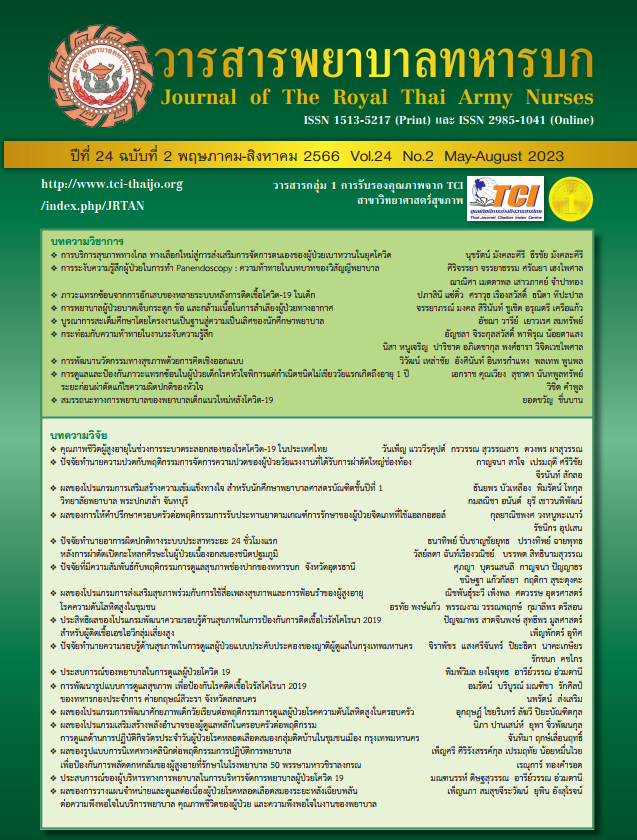Effects of Mindfulness-Based Nursing Program on Rumination and Executives Function in Major depressive disorder
Keywords:
Mindfulness-Based Nursing Program, Rumination, Executives Function, Major Depressive DisorderAbstract
This present study was a 2nd phase of the research and development of the Develop and Effect of Mindfulness-Based nursing program on Rumination and Executive function in Major depressive disorder. The aimed to study the effects of Mindfulness-Based nursing program on Rumination and Executive function in Srithanya Hospital during 1st June 2022 to 31st May 2023. with a quasi-experimental research. Each group consists of 46 people. The collecting data tools were personal data, Ruminations scale and Executive functions. The data retrieved were statistical analyzed including descriptive and Repeated measured ANOVA statistical test. The result revealed that different experimental group and the control group of ruminations and executive functions It was statistically with statistical significance (p < .05). It can be concluded the Mindfulness-based nursing program for Major depressive disorder can reduce rumination and improving the executive functions effectively. It was the guideline for the appropriate treatment of rumination and executive functions patients after 1 month of treatment and 3 months of follow-up. for Major depressive disorder.
Downloads
References
Zhang R, Peng X, Song X, Long J, Wang C, Zhang C, ... & Lee M. The prevalence and risk of developing major depression among individuals with subthreshold depression in the general population. Psychological Medicine. 2023; 53(8): 3611-20.
Zhang L, Cai H, Bai W, Zou Y, Feng X, Li C,.& Xiang T. Prevalence of suicidality in clinically stable patients with major depressive disorder during the COVID-19 pandemic. Journal of affective disorders. 2022; 307: 142-48.
Ali S, Rhodes L, Moreea O, McMillan D, Gilbody S, Leach C, ...& Delgadillo J. How durable is the effect of low intensity CBT for depression and anxiety? Remission and relapse in a longitudinal cohort study. Behaviour research and therapy. 2017; 94: 1-8.
Sim K, Lau K, Sim J, Sum Y, & Baldessarini J. Prevention of relapse and recurrence in adults with major depressive disorder: systematic review and meta-analyses of controlled trials. International Journal of Neuropsychopharmacology. 2016; 19(2): 1-13.
Kamenov K, Twomey C, Cabello M, Prina A, & Ayuso-Mateos J. The efficacy of psychotherapy, pharmacotherapy and their combination on functioning and quality of life in depression: a meta-analysis. Psychological medicine 2017; 47(3): 414-25.
Schwert C, Aschenbrenner S, Weisbrod M, & Schröder A. Cognitive impairments in unipolar depression: the impact of rumination. Psychopathology. 2017; 50(5): 347-54.
Vilamart K, Haenjohn J, & Sirithadakunlaphat S. Development of Program for Promoting Executive Functions of the Brain by Neuro-Linguistic Programming for Secondary School Students with Internet Addiction. Journal of Royal Army Nurses. 2021; 22(3): 237-46. (in Thai)
du Pont A, Rhee S, Corley P, Hewitt K, & Friedman P. Rumination and executive functions: Understanding cognitive vulnerability for psychopathology. Journal of Affective Disorders. 2019; 256: 550-59.
Pan Z, Park C, Brietzke E, Zuckerman H, Rong C, Mansur R, & McIntyre R. Cognitive impairment in major depressive disorder. CNS spectrums. 2019; 24(1): 22-9.
Pu S, Setoyama S, & Noda T. Association between cognitive deficits and suicidal ideation in patients with major depressive disorder. Scientific reports. 2017; 7(1): 1-6.
Pliankerd P. Depressive disorder: Nurse’s role in nursing care. Journal of Royal Army Nurses. 2021; 15(1): 18-21. (in Thai)
Cladder-Micus M, Becker E, Spijker J, Speckens A, & Vrijsen J. Effects of mindfulness- based cognitive therapy on a behavioural measure of rumination in patients with chronic, treatment-resistant depression. Cognitive Therapy and Research. 2019; 43(4): 666-78.
Amiri M, Rabiei M, & Donyavi V. Effectiveness of mindfulness training in enhancing executive function and decreasing symptoms of depression and anxiety in patients with multiple sclerosis (MS). Journal of behavioral and brain science. 2016; 6(8): 329-36.
Segal V, Williams M, & Teasdale J. Mindfulnessbased cognitive therapy for depression. Second Edition. New York: Guilford Publications; 2018.
Wongphiromsant Y. Manual of Mindfulness base counseling. Bangkok: Beyond Publishing; 2020. (in Thai)
Wongsakorn P, Bunthumporn N, & Soonthornchaiya R. The Effects of A Mindfulness Based Practice on Stress Among Inmates. Journal of Royal Army Nurses. 2018; 15(1): 269-78. (in Thai)
Puapan S. Caring for Suffering Patients with Human Minds: Application of Theory Watson’s Human Care Part 1. Nursing Science Journal Christian University. 2015; 2(2): 139-50. (in Thai)
Puangladda S, Wasuwat S, & Budsuwan. The Development of Mindfulness-Based Nursing Program for Major Depressive Disorder. Journal of Royal Army Nurses. 2023; 24(1): 432-40. (in Thai)
Diggle P, Heagerty P, Liang K, Zeger S. Analysis of longitudinal data. 2nded.Oxford University Press.; 2002.
Thanoi W, Panitrat R, Phancharoenworakul K, Thompson E, & Nityasuddhi D. TheAdolescent Ruminative Response Scale (Thai version): Psychometric Properties. Nursing Science Journal of Thailand. 2011; 29(3): 19-38.
Fox C, Mueller S, & Gray H, RaberJ, Piper B. Evaluation of a short-form of the Berg Card Sorting Test. PloS one. 2013; 8(5): e63885.
Chuangchai W, & Siripakarn Y. Executive function training in connection with falls on elderly Thais. Journal of population ageing, 2019; 12(2): 137-49.
Downloads
Published
How to Cite
Issue
Section
License
Copyright (c) 2023 Journal of The Royal Thai Army Nurses

This work is licensed under a Creative Commons Attribution-NonCommercial-NoDerivatives 4.0 International License.
บทความหรือข้อคิดเห็นใดใดที่ปรากฏในวารสารพยาบาลทหารบกเป็นวรรณกรรมของผู้เขียน ซึ่งบรรณาธิการหรือสมาคมพยาบาลทหารบก ไม่จำเป็นต้องเห็นด้วย
บทความที่ได้รับการตีพิมพ์เป็นลิขสิทธิ์ของวารสารพยาบาลทหารบก
The ideas and opinions expressed in the Journal of The Royal Thai Army Nurses are those of the authors and not necessarily those
of the editor or Royal Thai Army Nurses Association.






